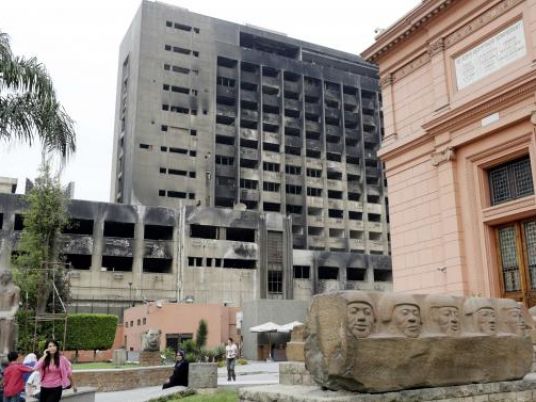A total of 5720 candidates submitted applications for People’s Assembly elections during the allotted five-day window, which ended on Sunday night, announced the High Elections Commission, according to state-run Al-Akhbar.
More than 700 candidates–vying for 508 seats–appeared on the National Democratic Party (NDP) list released Sunday night, reports state-run Rose Al-Youssef. The party’s decision to allow more than one candidate to compete over the same seat serves to give voters the right to select their preferred candidate, said NDP Secretary General Safwat al-Sherif, according to Al-Akhbar.
Two particularly controversial issues surround the announcement. The first revolves around the status of excluded candidates. The second has to do with the nomination of cabinet ministers, which critics say threatens the integrity of the electoral process as ministers use state resources to gain popular support.
In the final hours before the announcement, early celebrations began and clashes broke out in various governorates as potential candidates awaited their fate, reports Rose Al-Youssef in a page-length coverage of the issue. In Omraniya Governorate rumors regarding the party’s finalists led some prospective winners to host various celebrations that included animal sacrifices. In Aswan, NDP governorate secretary, Khalaf Youssef, tried to control party fragmentation by reminding members of the political rewards of party loyalty. All dissenting members will be punished, Youssef said.
In Giza, NDP governorate secretary, Sherif Wali, held an emergency meeting with female quota candidates in an attempt to allay their fears and assure them of the fairness of the electoral system. Wali swore three times that he did not know the finalists’ names.
In Gohayna, NDP representative Hamam Abdin decided to run as an independent against Minister of Irrigation Mohammed Nasr Allam. In Helwan, four NDP members holding organizational positions chose to run as independents. The party members include Mohammed Mostafa Ami, workers’ secretary, and Gamal Ghoneim, workers’ secretary in Helwan, who will be competing against Minister of Military Production Sayyid Meshal.
In Imbaba, there was significant anger among excluded candidates following the announcement of the party’s final list. According to the same report, members of the Muslim Brotherhood sent text messages to Kafr Al-Zayat in an attempt to cast doubts on the integrity of the NDP’s internal elections. The messages indicated the party’s nominee for the workers’ seat was Amin Radi, who had changed his status from “professional” to “worker.”
The announcement of the NDP’s list has also fueled some critical commentary regarding the nomination of all nine government ministers in this year’s elections. Al-Wafd, published by the liberal Wafd party, dedicates half a page to a report on the districts of “happiness, and bliss,” in reference to the districts where ministers are vying for seats. The report points out that despite government assurances that ministers are merely other candidates, there is significant evidence that ministers are the “state’s candidates”, not the “party’s candidates.”
For instance, Prime Minister Ahmed Nazif has put all of his government’s resources behind the party’s ministerial candidates, particularly Minister of Irrigation Mohammed Nasr Al-Din. Al-Din promised to initiate service projects worth LE60 million in Gohayna. Several other government agencies will be involved in the implementation of these projects.
Other ministers such as Minister of Social Solidarity Ali Al-Moselhi, and Minister of Finance Youssef Botrous Ghali, have promised their constituencies to provide needs specific to their district. In the Raml district of Alexandria, Minister of Municipal Development Abdul Salam Al-Mahgoub assured residents they will receive refrigerators and washing machines.
In related news, the University of Alexandria has redrawn employee electoral districts to ensure staff members have the right to vote for Minister of Parliamentary Affairs Mufid Shehab, according to Al-Wafd. Shehab will be running in the Moharam Beih district.
Member of Wafd Party politbureau Ahmed Oda described the phenomena as a “badly-directed play” where the audience knows the ending, referring to the fact that the election of these ministers is a foregone conclusion. Amr al-Shubaki, a researcher at the Ahram Center for Strategic Studies, argued that this trend reflects an unhealthy mix between state and party institutions and that any reform effort must ensure the independence of the state and its neutrality toward all political parties.
Egypt's papers:
Al-Ahram: Daily, state-run, largest distribution in Egypt
Al-Akhbar: Daily, state-run, second to Al-Ahram in institutional size
Al-Gomhorriya: Daily, state-run
Rose al-Youssef: Daily, state-run, close to the National Democratic Party's Policies Secretariat
Al-Dostour: Daily, privately owned
Al-Shorouk: Daily, privately owned
Al-Wafd: Daily, published by the liberal Wafd Party
Al-Arabi: Weekly, published by the Arab Nasserist party
Youm7: Weekly, privately owned
Sawt al-Umma: Weekly, privately owned




